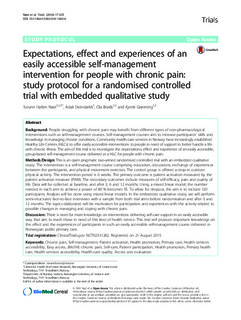| dc.description.abstract | Abstract
Background: People struggling with chronic pain may benefit from different types of non-pharmacological
interventions such as self-management courses. Self-management courses aim to increase participants’ skills and
knowledge in managing chronic conditions. Community health-care services in Norway have increasingly established
Healthy Life Centres (HLCs) to offer easily accessible interventions to people in need of support to better handle a life
with chronic illness. The aim of this trial is to investigate the expectations, effect and experience of an easily accessible,
group-based self-management course delivered at a HLC for people with chronic pain.
Methods/Design: This is an open pragmatic two-armed randomised controlled trial with an embedded qualitative
study. The intervention is a self-management course comprising education, discussions, exchange of experiences
between the participants, and physical movement exercises. The control group is offered a drop-in outdoor
physical activity. The intervention period is 6 weeks. The primary outcome is patient activation measured by the
patient activation measure (PAM). The secondary outcomes include measures of self-efficacy, pain and quality of
life. Data will be collected at baseline, and after 3, 6 and 12 months. Using a mixed linear model, the number
needed in each arm to achieve a power of 80 % becomes 55. To allow for dropout, the aim is to include 120
participants. Analysis will be done using mixed linear models. In the embedded qualitative study, we will perform
semi-structured face-to-face interviews with a sample from both trial arms before randomisation and after 3 and
12 months. The topics elaborated will be motivation for participation and experiences with the activity related to
possible changes in managing and coping with chronic pain.
Discussion: There is need for more knowledge on interventions delivering self-care support in an easily accessible
way that aim to reach those in need of this kind of health service. This trial will produce important knowledge on
the effect and the experiences of participants in such an easily accessible self-management course delivered in
Norwegian public primary care. | |
